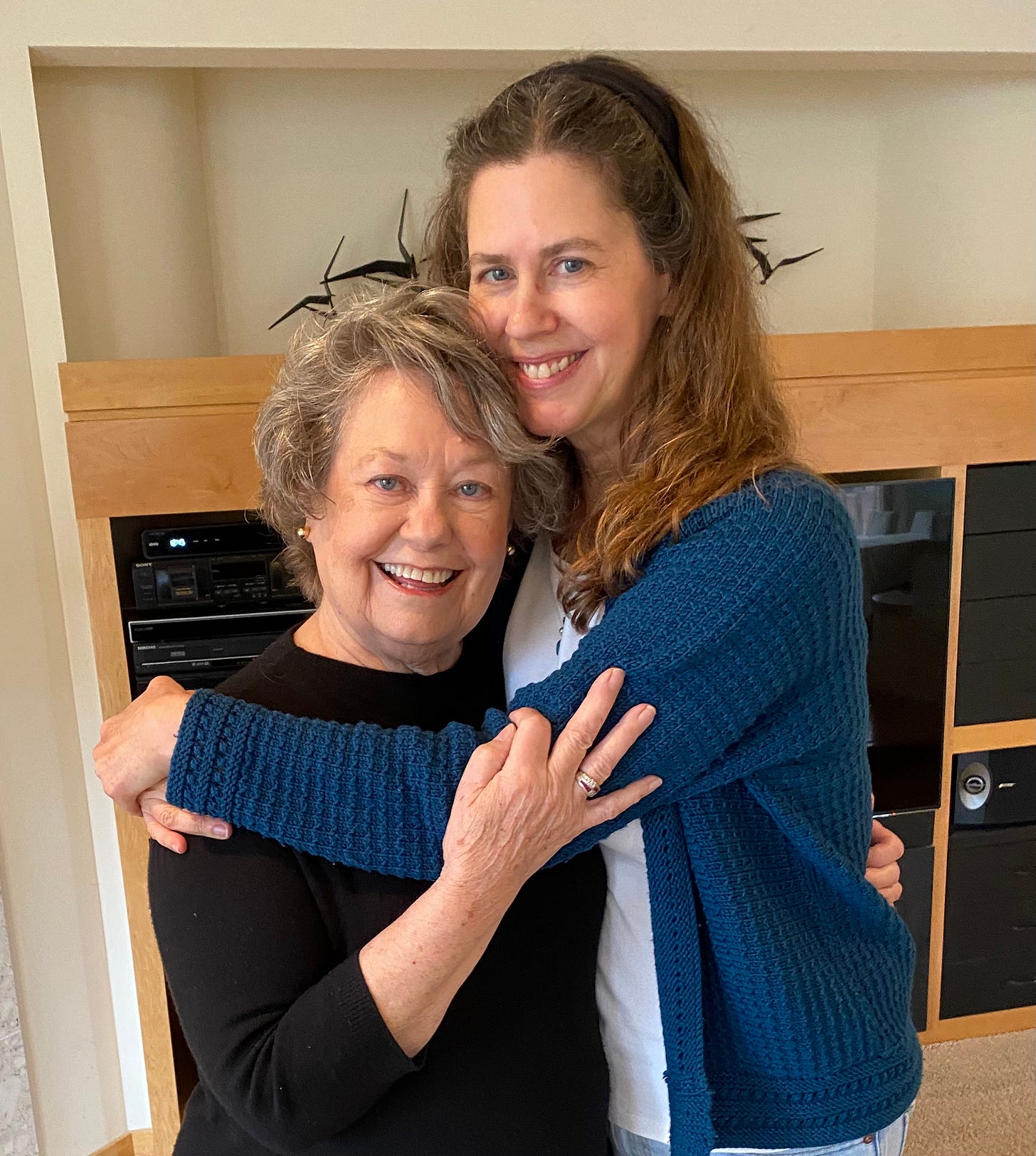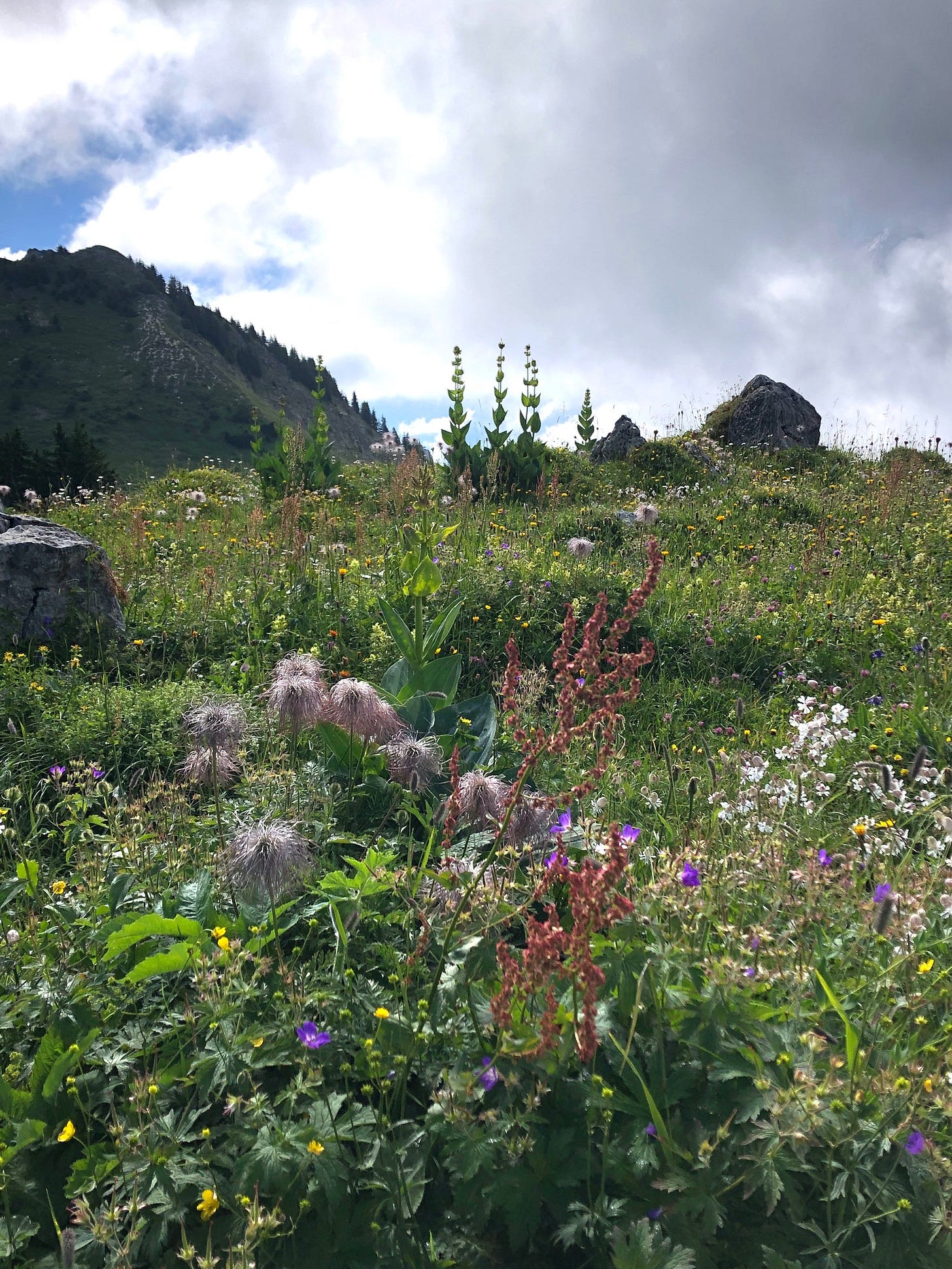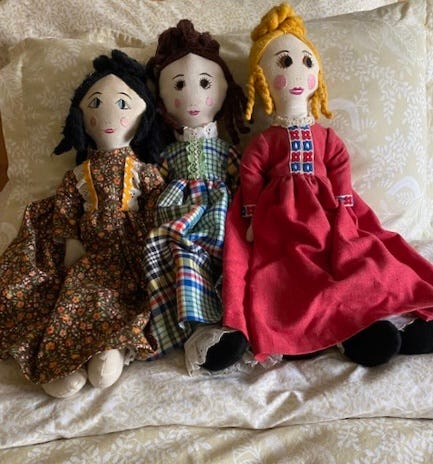Longtime readers are already familiar with my wonderful mom—how she never forced me to eat or even taste a food if I didn’t want to; how she let me quit piano and Girl Scouts when I was anxious and stressed; and how during her decades-long career as a special-ed teacher she helped emotionally-troubled special-needs kids learn to read and to thrive in school.

In honor of Mother’s Day, let’s celebrate moms and the many wonderful things they have done for us. Readers, please chime in with tributes to your own moms!
Moms Help Us to Become Ourselves
There’s a story about an eighteenth-century rabbi, Zusha, who said that when he died and went to the gates of Heaven, he wouldn’t be afraid if God asked him “Why weren’t you Abraham?” because he didn’t have Abraham’s intelligence. And he wasn’t afraid God would ask him “Why weren’t you Moses?” because he wasn’t a natural leader like Moses. The question he feared was “Why weren’t you Zusha?”
It is tempting for parents to push their kids to grow up to be just like them, but parents’ real mission is to help kids grow up to be themselves, even if that means they will be different from their parents.1 Here are just a few examples of times when my mom encouraged me, supported me, and helped me to become truly myself:
When I wanted to go to college in another state, it was painful for my mom, but she celebrated with me when I headed off to school.2
When I decided to be a stay-at-home mom and housewife instead of working for pay, she knew that was the right choice for me and has told me many times how proud she is of me.
When we moved overseas many years ago, I know my mom was sad we were so far away. Yet she never once complained and instead told us she was excited for our family to have the opportunity.
How about you, readers? How has your mom helped you to become yourself?
Moms Lay Down the Law
One of the most important ways moms show love is by making and enforcing the rules we need in order to grow into good human beings. Kids often chafe at these rules, and we sometimes don’t thank our moms until much later (if ever). So, thank you, Mom, for sticking to rules that I disliked at the time but am so grateful for now:
Insisting I clean my room, do household chores, and take responsibility for my own mess;
Teaching me to cook my own food instead of making special picky-eater meals for me;
Limiting the sugar we ate so I never developed a taste for it (and to this day I am not the least bit tempted by sweets);
Expecting me to do well in school (except gym, which was a lost cause anyway);
Making sure we visited our grandfather in the nursing home every week;
Expecting me to volunteer and to donate part of my allowance to charity; and
Making me wear sunscreen and a T-shirt at the beach (which was deeply uncool, especially in middle school!), long before everyone knew how important sun protection was.3
How about you, readers? How did your mom show her love for you by laying down the law? What rules did she impose that you disliked at the time but are grateful for now?
Moms Give Their Time and Talents
Our moms have given us so much. Here are some of the ways my mom has shared her time and talents with me to make my life better:
A gifted seamstress, my mom designed and sewed costumes and toys for me throughout elementary school, including a Marie Antoinette dress, a flower-girl dress to match the bridesmaids’ outfits at a family wedding, and these awesome prairie-girl dolls:
She prepared healthy food from scratch, including homemade bread (my favorite was rye-molasses) and yogurt (flavored with applesauce and cinnamon or with raspberries we picked in the woods)—and yes, my childhood was as idyllic as it sounds.
She can do complicated calculations in her head and loves logic puzzles (and is a ferocious opponent in bridge and other card games, so beware!). When I was a kid, she talked up her love of math—which gave me the confidence to work hard at and enjoy math and science too.
When I was in high school and studied piano at a conservatory downtown, she drove me there every Friday afternoon—a route that included more than forty stoplights (we got curious and counted them)—after a long day teaching, for four years.
She spent more than an hour a day on the phone with me in the months after my son was born to help me through postpartum depression,4 and she lived with us for a month after my daughter was born to ensure I wouldn’t have such a tough time again.
How about you, readers? What has your mom given you? How has she shared her time and talents to improve your life?
Moms Give Us Advice
My mom didn’t really go in for giving advice. She believes that most of the time parents shouldn’t tell kids what to do, and that parents are more effective when they set a good example for their kids and support them as they make their own decisions about what is right for them. However, along the way she did offer a few gems, which I still follow to this day:
Always play outside for a little bit each day, no matter how cold it is.
It takes just as many steps to make the bed messily as neatly, so you might as well do a good job the first time.
Never get angry about delays at airports. It doesn’t help, and it just makes everyone else feel bad.
Learn to type. (This advice applies to any practical task we are better off learning to do for ourselves than delegating to other people.)
(When, as a new teacher, I learned that I was going to have a student who had some emotional problems): You’re just going to have to make up your mind ahead of time that you’re going to like this kid. (It worked!)
(When I was a new mother struggling with a baby who cried more than seven hours a day, and yes, we timed it): No one knows as much about this baby as you do. You don’t need to listen to anyone else. You will know the right thing to do.
How about you, readers? What is the best advice your mom has given you?
Moms Take Our Side and Cut Us Some Slack
No matter how strict they are with us, sometimes our moms recognize that we need them to take our side or give us a bit of a break, and so they let us stay home for a mental health day, or they fight a battle for us, or they let us off the hook about something. My mom is normally very sweet and mild-mannered, but she can bend the rules and be a mama bear when necessary. For example:
When I was twelve, my algebra teacher assigned a truly insane amount of homework every night, and it was stressing me out. One night I had fifty—fifty!—problems to solve. My mom knew I was a perfectionist and would never turn in an incomplete assignment, so she did half of the problems for me.
A high school teacher made the mistake of telling my mom that I was “flighty,” and boy did she give him an earful about his sexism. The next day at school he looked at me and said, “Your mom. Whoa!” And then he visibly shuddered. Good! Maybe my mom helped him to learn something!
I had a high school “friend” who teased me a lot, and my mom gave me a useful insight when she told me, “He thinks he’s funny, but he’s not. He’s just mean.”
How about you, readers? Do you have a story of a time your mom took your side or relaxed the rules when you needed it?
And Finally, Moms Get Appendicitis for Us
You think I’m joking, but no. All parents will agree that we would gladly take on our kids’ pain for them, if only it were possible. When my son was a senior in high school, I had the opportunity to perform this service for him. He was preparing to take the International Baccalaureate (IB) exams, and his scores would determine whether he would go to his top-choice or second-choice university.5 He was quite well-prepared, so I joked that he had nothing to worry about, so long as he didn’t get appendicitis. Ha ha. I made that joke more than once, which was dumb of me, because Nemesis appears to have heard me, and she punished me for my hubris. On the morning of the first day of exams, I was laid low by intense abdominal pain, my husband rushed me to the emergency room, and—you guessed it—it was appendicitis. And I would gladly do it again! I attracted the bad vibes away from my son, who earned a better score than the required minimum for his top-choice university. Now I have nifty scars that I consider a badge of honor, and also a symbol of what we moms are willing to go through for our kids.

How about you, readers? If you haven’t commented already, is there something terrific your mom has done for you? Please share your thoughts in the comments! And then please call your mom and share with her what you wrote here!
The Tidbit
When we were kids, my brother and I loved my mom’s gorp cookies. This recipe is adapted from the one in Ellen Buchman Ewald’s Recipes for a Small Planet, a cookbook that follows the principles of the nutritionist Frances Moore Lappé. My mom would bake enormous batches of these cookies to take Up North to the Lake, where they fortified us during our long days of swimming, fishing, and playing. They make a perfect snack on a hike too! Don’t be surprised that these cookies aren’t super sweet. Think of them as more of a healthy snack for when you are out and about.
Gorp cookies
Ingredients
1/2c unsalted butter, softened
1c honey
1 egg
1tsp vanilla
1/4tsp salt
2T whole milk
1/2tsp baking powder
2c whole wheat flour
Gorp: A mixture of 1/2c sunflower seeds, 3/4c roasted and chopped peanuts, 1/2c raisins (or omit the raisins because your kids will think they’re yucky and will just pick them out anyway), and 1c chocolate chips
Method
Cream the butter, add the honey, and cream together until light.
Beat in the egg, vanilla, and milk.
In a separate bowl, mix the flour, salt, and baking powder. Add to the creamed mixture and stir just to blend.
Mix in the gorp.
Drop by spoonfuls onto an ungreased cookie sheet (lined with parchment paper if necessary to avoid sticking). Bake for 10–12 minutes at 375F/190C. Note: This recipe makes a ridiculous number of cookies, so you can freeze any that you aren’t planning to eat right away.
On this topic, I highly recommend Andrew Solomon’s beautiful book Far from the Tree: Parents, Children, and the Search for Identity. Solomon, an empathic and gifted interviewer, profiles parents whose children are very different from them, whether through physical or mental conditions, or through choices the children have made. Don’t be intimidated by the book’s length; each chapter is self-contained and only about fifty pages long, so you can read it in chunks in between other books.
Now that I have experienced dropping both kids off at college not merely in another state but in whole nother countries, believe me, I get it now. Mom, I am so sorry that I was embarrassed when you cried at my departure ceremony!
Sunscreen keeps you young! My mom, who has always been vigilant about sun protection, regularly hears people—even doctors—express shock when they learn how old she is. (Scroll back up to the unedited, no-filter photo: I won’t reveal my mom’s age, but she is at least twenty years older than she looks.) One reason is sunscreen. Of course, the other reason is that, as George Orwell once said, “At fifty everyone has the face he deserves.”
A brief PSA about postpartum depression: One of its most insidious effects is that the sufferer might not realize that what she is feeling isn’t normal, or she might be so ashamed that she will try to hide what is happening. If a woman you care about seems down or not herself after she has had a baby, please lend an ear, help with chores, or encourage her to see her doctor—even if she says she is fine. She might not be, and she might need you.
In the UK, where my son went to college, universities make offers to students that are conditional on the scores they receive on the several very demanding and lengthy exams they take at the end of their senior year (the A-levels or the IB). Applicants designate a top choice university (which requires a higher minimum score) and a backup (whose required score the student knows s/he can achieve). Only when the exam results come back do students know which university (if any!) they will attend. Yes, this is stressful!





Until my 10-years-younger brother was born, I was the only boy among 4 sisters. I don't think my mother favored me, but I had a relationship with her that was different from her relationship with any of those 4 sisters. As a very trad-Catholic, I think she felt quite certain about how to raise girls, but maybe was less sure about raising boys. No doubt she would be considered a sexist nowadays, because I think she imagined that men and women had very different roles in families and in society. My mother was more a more "prescriptive" parent to my sisters, in terms of what she encouraged them or directed them to do; with me, she tended to encourage me to find my own way, and she always supported me in whatever I chose to do and forgave me when I tried but failed.
If I struggled with algebra, she would tell me "it's OK; some people aren't good at math". My physics professor dad didn't see it that way. We had a piano in the house. All us kids had to take lessons; one sister liked lessons. Three sisters didn't, and neither did I. But those three sisters had to keep at it, while I was allowed to quit lessons. As a result, I began playing the piano on my own, never learning to read music, but teaching myself chords and finding a way to play things by ear. It turned out I was really good at that—not piano technique, but "finding" music on my own.
I look back now and I understand two things about myself: 1): being raised by a strong mother among 4 beloved sisters made me into a man who has always had strong, productive relationships with women in the social and professional realm. It's ironic, but the "sexist" notions about roles did not imprint on me, in terms of how I understand women's roles. This serves me well in my academic life, where women now outnumber men among the faculty in our department, and I have excellent partnerships doing team-teaching with some of these women.
2): That freedom to "explore" and find my way has everything to do with who I have become, and how I got to where I am. I changed majors about 5 times, but ultimately ended up in a profession that I love, and I want to never retire. Also, that freedom with the piano—endless hours of entirely voluntary unstructured noodling—meant that much later in life, long after my mother had passed away, I discovered that I was a songwriter. Not on piano, but on guitar. I've now written hundreds of songs, and I have a "serious amateur" band who get together every week to play. It is a source of constant joy for me.
I love my work, and I love my music. Thanks mom.
Epilogue: my mom died when I was 25, and she was 52 (cancer). About 4 years before she died, she bought me a much nicer guitar (Gibson Hummingbird) than she could afford, but she got a deal on it because it was a scratched-up store demo. I had that guitar around for many years, playing it occasionally, but for some reason I began to play it a lot more, later in life. What I began to do differently was to play the guitar experimentally and open-endedly, instead of trying to play songs written by others. That has opened up a new world for me, a world of constant renewal, a place of great creative intimacy with my bandmates.
And I never pick up that Gibson Hummingbird (still my primary guitar) without thinking of mom.
I am sure your mother is having the best time reading today’s post, a perfect gift to her on this special day. Happy Mother’s Day to both of you!